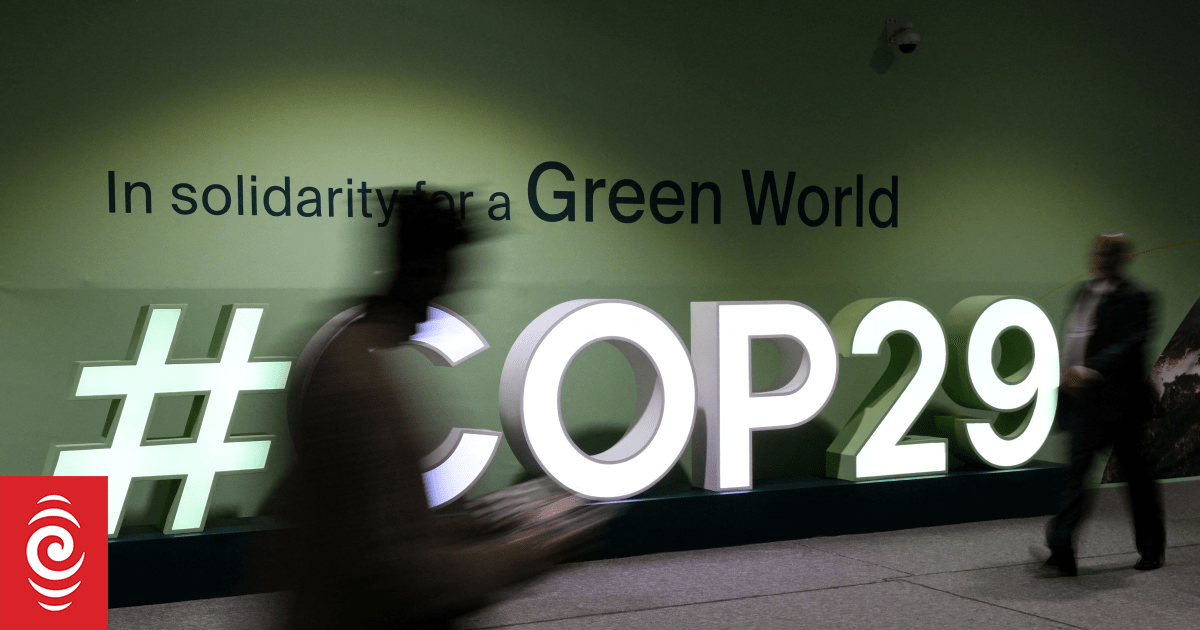By Kate Abnett, Valerie Volcovici and Nailia Bagirova, Reuters

Attendees walk past the COP29 logo during the United Nations Climate Change Conference (COP29) in Baku, Azerbaijan, on 21 November 21, 2024.
Photo: AFP
Wealthy countries raised their offer of climate finance to US$300 billion (NZ$514b) a year at COP29 on Saturday, raising hopes of a deal with developing nations that had dismissed an earlier proposal as insufficient to address the impacts of global warming.
The UN climate summit had been due to finish on Friday but ran into an extra day as negotiators from nearly 200 countries – who must adopt the deal by consensus – tried to reach agreement on the contentious funding plan for the next decade.
The two-week conference cut to the heart of the global debate over the financial responsibility of rich industrialised countries, whose historical use of fossil fuels caused the bulk of greenhouse gas emissions, to compensate for the damage wrought by climate change.
Negotiators from several developing countries and island nations aired frustration over a UN process they said was not rising to the challenge of global warming and temporarily walked out of talks on Saturday afternoon.
It was unclear if they would ultimately accept the proposed figure of $300b a year by 2035.
Fiji’s Deputy Prime Minister Biman Prasad said he was optimistic.
“When it comes to money it’s always controversial, but we are expecting a deal tonight,” he told Reuters.
COP29 President Mukhtar Babayev asked country delegations to overcome their differences: “I ask you to now step up your engagement with one another to bridge the remaining divide,” he said in a plenary speech.
Developing countries had dismissed as insufficient a previous proposal, drafted by the Azerbaijan host on Friday, that would have seen the United States, Europe and other developed countries lead $250b (NZ$428b) in annual funding.
Past failures to meet climate finance obligations have also made developing countries mistrustful of new promises.
Five sources with knowledge of the closed-door discussions said the EU had agreed it could accept the higher number of $300b a year. Two of the sources said the United States, Australia and Britain were also on board.
A European Commission spokesperson and an Australian government spokesperson both declined to comment on the negotiations. The US delegation and the UK energy ministry did not immediately respond to requests for comment.
The new goal is intended to replace developed countries’ previous commitment to provide $100b (NZ$171) in climate finance for poorer nations per year by 2020. That goal was met two years late, in 2022, and expires in 2025.
Representatives from the least developed countries and small island nations blocs walked out of a negotiating room in frustration at one point on Saturday afternoon, but said they remained committed to finding a deal.
“We want nothing more than to continue to engage, but the process must be inclusive,” the Alliance of Small Island States said in a statement.
In a sign of some progress, countries agreed Saturday evening on rules for a global market to buy and sell carbon credits that proponents say will mobilise billions of dollars into new projects to help fight global warming.
Pushing for US$390b
Marina Silva, Brazil’s minister of the environment and climate change, has said that the Amazon rainforest nation – which is set to host next year’s summit – was pushing for $390b (NZ$668b) annually from developed countries by 2035.
“After the difficult experience that we’re having here in Baku, we need to reach some result, some outcome which is minimally acceptable in line with the emergency we are facing,” she said on Saturday in a speech to the summit.
Negotiators have worked throughout the two-week summit to address other critical questions on the finance target, including who is asked to contribute and how much of the funding is on a grant basis, rather than provided as loans.
The roster of countries required to contribute – about two dozen industrialised countries, including the US, European nations and Canada – dates back to a list decided during UN climate talks in 1992.
European governments have demanded others join them in paying in, including China, the world’s second-biggest economy, and oil-rich Gulf states.
Donald Trump’s US presidential election victory this month cast a cloud over the Baku talks. Trump, who takes office in January, has promised to again remove the US from international climate cooperation, so negotiators from other wealthy nations expect that under his administration the world’s largest economy will not pay into the climate finance goal.
A broader goal of raising US$1.3 trillion (NZ$2.23t) in climate finance annually by 2035 – which would include funding from all public and private sources and which economists say matches the sum needed – was included in the draft deal published on Friday.
Sign up for Ngā Pitopito Kōrero, a daily newsletter curated by our editors and delivered straight to your inbox every weekday.

